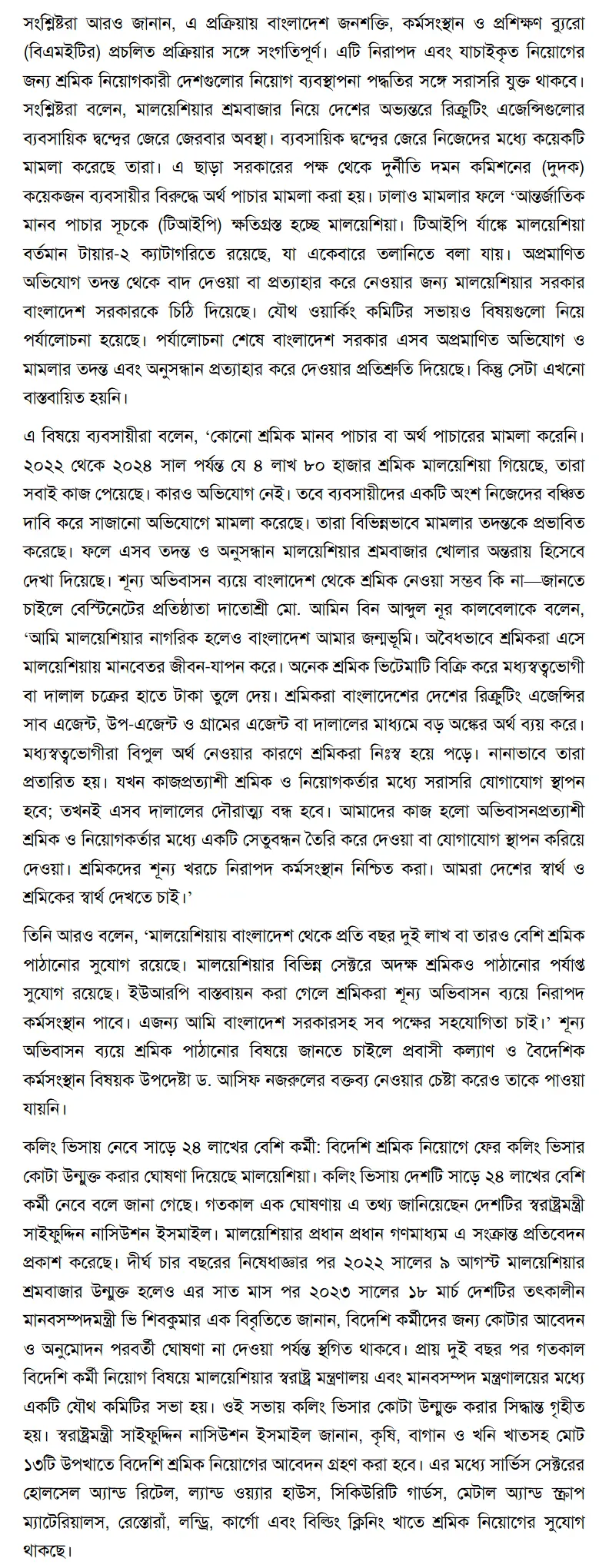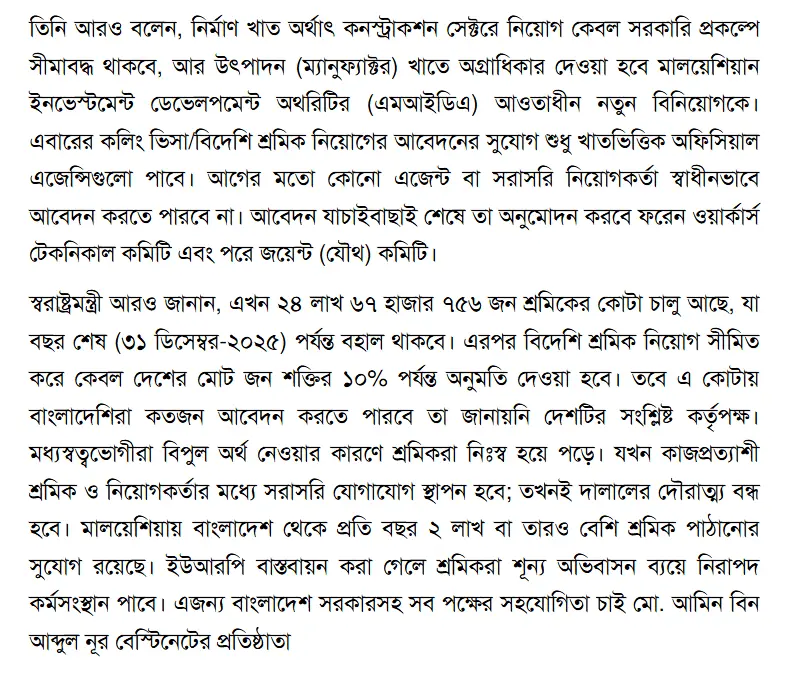Bangladeshi workers may soon have the opportunity to migrate to Malaysia for employment at zero migration cost. Under this initiative, all expenses will be borne by the Malaysian employers, making it a groundbreaking step in fair and ethical labor recruitment.
A Landmark Announcement
Following the visit of Dr. Muhammad Yunus, Chief Adviser of the interim government of Bangladesh, to Malaysia a close ally officials involved in manpower export hinted at this historic development. Both governments are working together to establish a transparent and fair system for labor migration.
Universal Recruitment Process (URP) and Direct Labor Recruitment (DLR)
To make this system effective, Malaysia has already approved a new model called the Universal Recruitment Process (URP), which will operate under the Direct Labor Recruitment (DLR) platform. Both URP and DLR will be driven by Artificial Intelligence (AI), ensuring fairness and preventing syndicates or manipulation.
Under this system, Malaysia will recruit workers from 14 source countries including Bangladesh. The government of Bangladesh has also shown a positive stance, and experts believe the implementation will take place soon, allowing Bangladeshi workers to migrate with almost zero migration cost.



How the Process Works
All recruitment activities, from visa application to medical checkups and immigration, will be processed through Malaysia’s Foreign Worker Centralized Management System (FWCMS).
FWCMS is a digital platform that manages:
- Foreign worker registration
- Visa applications and approvals
- Medical checkup reports
- Employer-worker data coordination
- Immigration processes
This system is controlled by Malaysia’s Ministry of Home Affairs and the Immigration Department, with IT firm Bestinet Sdn. Bhd. responsible for development and maintenance.
Zero Migration Cost in Practice
Through the AI-powered URP and DLR system:
- Workers will register via an AI-driven mobile application.
- Employers will cover expenses such as air tickets, medical tests, visas, and training.
- Workers won’t need to pay any recruitment fees.
- Upon joining their jobs in Malaysia, URP may deduct a small service fee from the first month’s salary to cover administrative costs.
This approach ensures compliance with International Labour Organization (ILO) standards, which state that all migration expenses must be borne by the employer, not the worker.
Currently, Bangladeshi workers often spend $4,000–$5,000 (5–6 lakh BDT) to secure a job in Malaysia, often by selling property or borrowing money. The new system will eliminate this exploitation.
Ending Middlemen and Syndicates
Traditionally, local recruiting agencies, sub-agents, and brokers have exploited workers, charging them exorbitant fees. The new DLR system removes middlemen entirely:
- Licensed agencies will only handle legal and administrative work.
- Recruitment will happen directly between employer and worker.
- Corruption, fraud, and human trafficking risks will be drastically reduced.
AI translation tools will also allow employers and workers to communicate directly in their native languages, eliminating misunderstandings about contracts and job conditions.
Economic and Social Benefits
If implemented, this model will bring multiple benefits to Bangladesh:
- Increased remittance flow as workers won’t lose money to migration costs.
- Enhanced national image as a transparent labor-exporting country.
- Greater protection for workers, ensuring safe and fair employment.
- Opportunities for unskilled workers, as Malaysia requires labor across different sectors.
According to Bestinet founder Dato’ Sri Amin Bin Abdul Nor, who developed the URP and DLR systems, the goal is to build a bridge between employers and workers and eliminate the dominance of illegal brokers. He emphasized that Malaysia could absorb over 200,000 Bangladeshi workers annually, provided the system is implemented smoothly.
Calling Visa Opens for 2.4 Million Workers
In addition to the URP-DLR system, Malaysia has also reopened quotas under the calling visa scheme. The government announced that over 2.4 million foreign workers will be recruited across 13 sub-sectors including agriculture, plantations, security services, restaurants, laundries, logistics, and cleaning services.
While the quota remains open until December 31, 2025, priority will be given to official recruitment agencies rather than middlemen. This adds another huge opportunity for Bangladeshi workers to secure jobs abroad without falling victim to fraud.
Challenges and Ongoing Issues
Despite the positive developments, disputes among Bangladeshi recruiting agencies and allegations of corruption remain obstacles. Several cases related to money laundering and human trafficking have surfaced, affecting Malaysia’s international labor reputation.
Malaysian authorities have urged Bangladesh to resolve these legal disputes and ensure a corruption-free process, as failure to do so could hamper the rollout of the zero-cost migration model.
Conclusion
The Zero-Cost Migration Model between Bangladesh and Malaysia is a revolutionary step that can transform the lives of thousands of Bangladeshi workers. By removing middlemen, ensuring employer-borne expenses, and utilizing AI-powered platforms, the process promises a fair, transparent, and worker-friendly system.
If successful, it will not only benefit the workers and their families but also strengthen Bangladesh’s position as a reliable source of labor worldwide.
